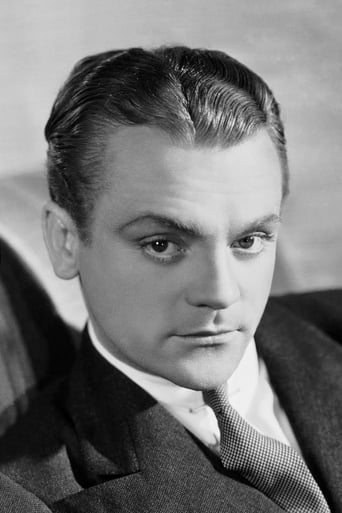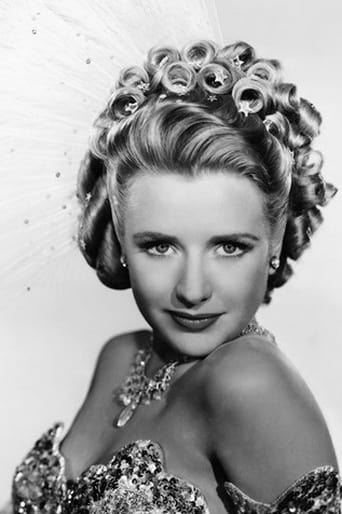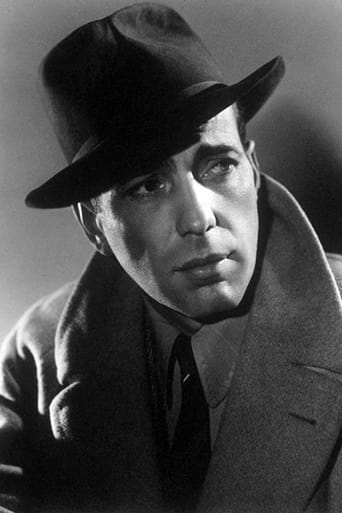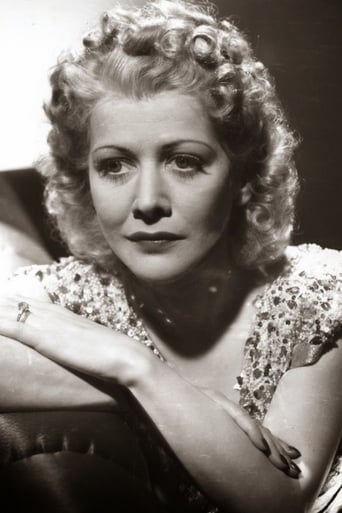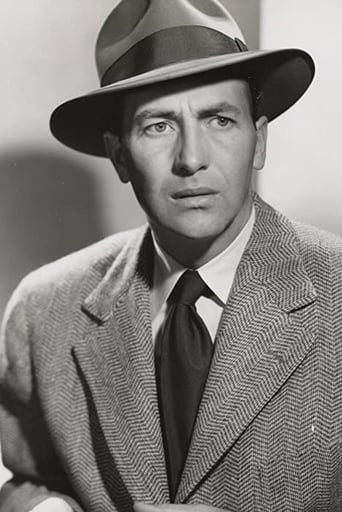bigverybadtom
The title implies a fun movie, but in fact is depressing throughout. The movie starts out with three infantrymen in a trench, with Bogart rather than Cagney proving to be the nasty psychopath who genuinely loves killing. The war ends and Cagney finds he cannot get his old job back in the automotive repair shop after two years' absence. He gets a job as a taxi driver, unaware that he is part of a liquor bootlegging racket, and is caught and arrested...and later is essentially forced into working in this racket. He prospers and his war buddy becomes his lawyer, but wants out when a mutual friend gets killed. Then there is the other war buddy who is a rival in the rackets...Unlike "The Public Enemy", Cagney does not voluntarily join the rackets, and is never happy while in them. Arguably one of the strongest gangster movies which is not a morality play as such.
Tad Pole
James Cagney as Boot-Legger kingpin Eddie Bartlett drinks "cow juice" exclusively as he rises to the top of the illegal booze biz, but fuel's his downhill slide with "the hard stuff" when She does him wrong. Priscilla Lane is perfectly cast as Eddie's teasing Femme Fatale Jean, while Humphrey Bogart is not much more than a window dressing piece of furniture only to be used by Jean to flatten her no longer convenient love triangle. Bogart's big moment comes less than five minutes into this ROARING TWENTIES tale, when he gleefully guns down a German teenager three seconds before an Armistice ends WWI. Like many "Great War" heroes, Sgt. Bartlett is all but forced at gunpoint by the U.S. government into a life of crime. As I heard a couple weeks ago on the Coast-to-Coast overnight news program, American President Hoover had future U.S. WWII generals Eisenhower, Patton, and MacArthur expend this country's leftover supply of poison gas to liquidate thousands of WWI vets (plus their wives and kids) when they came to Washington, DC, to lobby for restoration of their pension "guarantees" which Hoover had embezzled. (These were the original "I can't breathe" demonstrations.)
SnoopyStyle
Lloyd Hart (Jeffrey Lynn), Eddie Bartlett (James Cagney) and George Hally (Humphrey Bogart) are war buddies after falling into the same bomb crater. After the end of WWI, Lloyd goes back to practicing law. It's the start of prohibition. Eddie is out of luck without a job and Danny Green offers him his cab. He goes to see his pen pal Jean Sherman (Priscilla Lane) but she turns out to be a school girl. He gets thrown in jail after being tricked into delivering a bottle. Panama Smith (Gladys George) pays the fine to get him out of jail. Eddie soon joins Panama in the business. He becomes successful with a fleet of cabs. He keeps Lloyd as his reluctant lawyer. Then he runs into an older Jean. When he fights another bootlegger, he runs into George who's running liquor for the another guy. George convinces Eddie to join forces.The only problem for this movie is that Bogie doesn't come back until after an hour. So a warning to his fans, this is more a Cagney film. I would have preferred they stay together through the whole movie. That would make any double cross more compelling and any fights more heart breaking. There is singing, and there is gangster violence. It's a nice gangster movie with a couple of big gangster stars.
lugonian
THE ROARING TWENTIES (Warner Brothers, 1939), directed by Raoul Walsh, is a nostalgic look back into an era recollected by New York City columnist, Mark Hellinger. Taken from his original story, Hellinger introduces THE ROARING TWENTIES with this forward message: "It may come to past that at some distant date, we will be confronted with another period similar to the one depicted in this photo-play. If that happens, I pray that the events, as dramatized here, will be remembered. In this film the characters are composites of people I knew and the situations are those that actually occurred. Bitter or sweet, most memories become precious as the years move one." The story gets underway as Hellinger's treasured memories are presented in documentary style with voice-over narration by John Deering depicting the decade fondly known as "The Roaring Twenties."1918: The Great War (World War I), Eddie Bartlett (James Cagney), an American soldier on a battlefield falls into a shell hole where he encounters George Hally (Humphrey Bogart), followed by another soldier, Lloyd Hart (Jeffrey Lynn) who also drops in on them. After the Armistace is signed, ending the war, the men return to the United States, going on their separate ways. 1919: Time marches on. Soldiers return home to find the world has changed and are unable to return where they left off. George returns to his saloon business; Lloyd studies to become a lawyer; and Eddie, unable to get his old job at the garage, earns his living driving a taxi during off hours for his pal, Danny Green (Frank McHugh). Eddie comes to Minneola, Long Island, to meet Jean Sherman, the girl to whom he's been corresponding by mail during his days at war, only to become disappointed when Jean (Priscilla Lane) turns out to be a teenager attending high school. 1920: Prohibition begins, speakeasy's form with crime on the rise. Eddie, still driving a taxi, delivers a package for a passenger to hostess, Panama Smith (Gladys George), of the Henderson Club. He gets arrested when detectives find the package to be liquor. Upon his release, Eddie joins forces with Panama in the bootlegging racket. 1922: With his huge profits, Eddie buys his fleet of cabs. He becomes reacquainted with Jean Sherman, now an attractive young woman working as a chorus girl. Through his connections, Eddie gets her a job as a night club singer (somewhat inspired by popular vocalist, Ruth Etting). 1924: Bootlegging and crime are at its peak. The Panama Club, owned by Panama Smith, is established. Eddie teams up with George Hally. Jean falls in love with Lloyd, Eddie's personal lawyer. 1929: Black Tuesday, October 29th, Stock Market Crash. Jean becomes Lloyd's wife; Eddie and Panama, like everyone else, face financial ruin while George becomes head of a syndicate. 1932-33: Franklin Roosevelt becomes the president of the United States; Prohibition ends; Mark Hellinger's character study unfolds with big climatic finish.To help the story along, selected old-time popular songs from the roaring twenties era are selected, including "Carolina in the Morning" (dance number); "My Melancholy Baby," "I'm Just Wild About Harry," "It Had to Be You," "My Melancholy Baby" (all sung by Priscilla Lane); and "In a Shanty in Old Shanty Town" (sung by Gladys George). Other members of the cast include Paul Kelly (Nick Brown); Joseph Sawyer (Sergeant Pete Jones); Elisabeth Risdon (Jean's Mother); and John Hamilton (The Judge). As much as Cagney and Bogart make a great pair of friendly rivals, THE ROARING TWENTIES proved to be their third and final collaboration together, their second being a western, THE OKLAHOMA KID (1939). A well-crafted screenplay with memorable scenes, newsreels, realistic gun-plays, authentic costumes and hairstyles reflecting the roaring twenties are an added plus here. While Cagney and Lane share equal billing above the glittering title, and Cagney being the central character throughout, by film's end, it's Gladys George, whose excellent portrayal in the Texas Guinan style, who literally steals it from the rest of the cast. She even has the now famous closing line. No doubt her performance was deserving for an Academy Award nomination (Best Supporting Actress category), which, sadly, she did not get. Regardless, she makes the movie the true classic it's become. Along with Cagney and Bogart's ANGELS WITH DIRTY FACES, THE ROARING TWENTIES was one of their most revived movies on broadcast television in the 1970s. In 1974 alone, THE ROARING TWENTIES had five broadcasts from New York City television within a span of a few months/or weeks. Its continued popularity had led THE ROARING TWENTIES onto home video (later DVD) and finally cable television where it turns up regularly on Turner Classic Movies. THE ROARING TWENTIES simplifies a bygone era while Warner Brothers simplifies its grand style in crime themes that continues to be looked back with great admiration as one of the studio's finest accomplishments of its time. (***)


